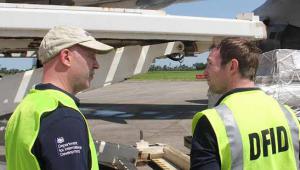By Nick Mann | 8 February 2013
The UK government will encourage British companies to invest more in the developing world, International Development Secretary Justine Greening said yesterday as she set out her policy goals.
Getting a job was the top priority for people in the developing world, she added, and the Department for International Development needed to look ‘more strategically’ at how to drive the economic growth that leads to job creation.
‘In the coming months, I will set out a fresh strategy for the DFID on economic development,’ she said. ‘It will aim to set out how the DFID can significantly expand the depth but also the breadth of the work we can do, helping countries to develop their economies.’
In particular, the DFID will work with other departments and with UK business groups such as the CBI to remove the ‘unnecessary hurdles’ to British businesses operating in Africa.
‘I want to work with our businesses and our universities to unlock opportunities not just for government to work with developing countries to help them develop, but for business to work with developing countries to help them develop too,’ Greening explained.
She added: ‘Sustainable public services need a private sector creating the wealth and taxes that will keep them funded. It is a symbiotic relationship.’
Greening said people who thought private sector investment was ‘part of the problem’ facing development countries were wrong.
‘I recognise there is investment that is irresponsible, that doesn’t spread wealth creation as much as we’d want,’ she acknowledged.
‘To have a stance that is sceptical about any investment at all is to draw a conclusion that is far too broad. In a sense, that mind-set has meant that so far, we’ve all tended to work to fix the “irresponsible investment” problems which are there and real and need to be fixed,’ she said.
‘But that shouldn’t stop us all from working hard to far more actively encourage and support responsible investment. Let’s make this a positive, constructive agenda, about job creation and financial independence.’
Providing the conditions for this meant the UK also had to help to build the institutions, governance and structures that give people in the developing world places to live and a way to be heard, as well as giving companies the certainty to invest, she stressed.
‘Growth and development requires stability, a pro-business environment, rule of law so that contracts can be enforced and property rights to allow people to invest in their property and keep the gains,’ she said.
‘And for this growth to reduce poverty, it needs to create jobs. Only then are we going to see a demographic dividend and not a demographic time-bomb.
‘And if that growth comes from natural resources, like oil, then it has to be accompanied by transparency, rules and strong institutions if it is going to benefit the many and not just the few.
‘And lastly, that growth must generate tax revenue. That requires a tax regime, an effective revenue authority and strong, corruption-free institutions that can use these revenues to deliver public services, like health and education.’ The DFID was working with the UK Revenue and Customs to make this happen, Greening noted.












